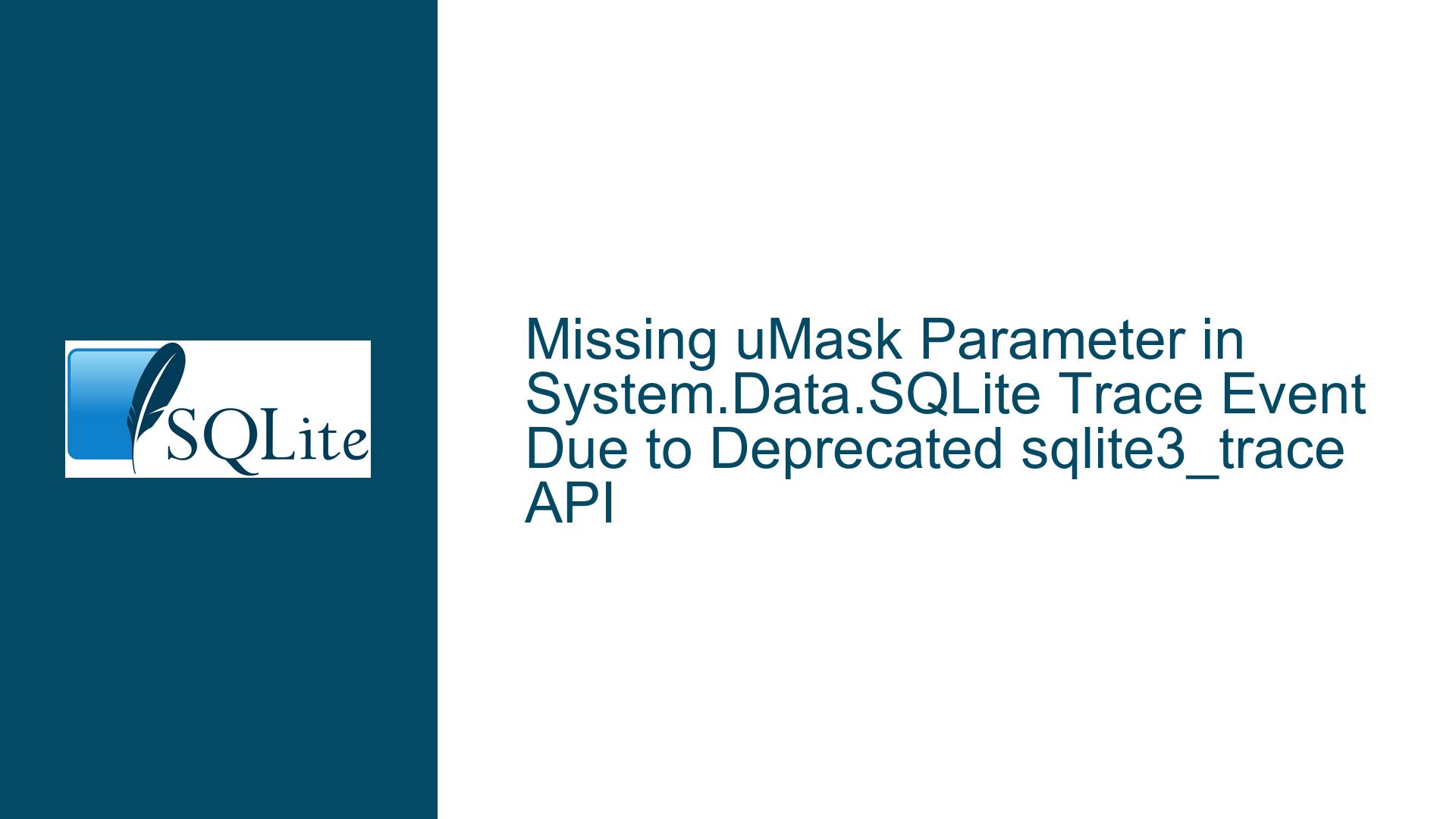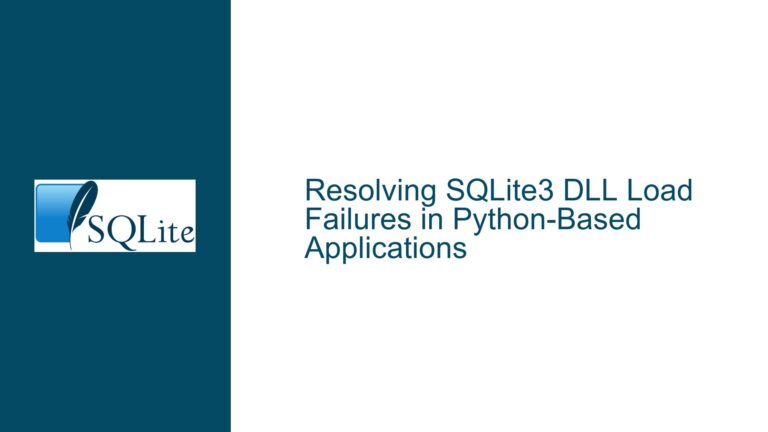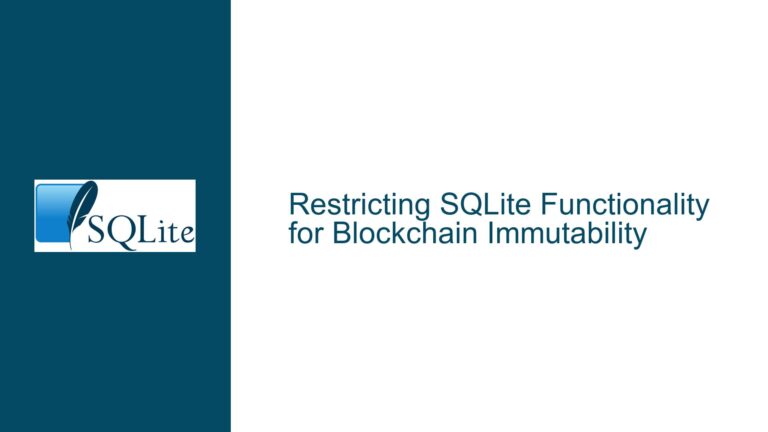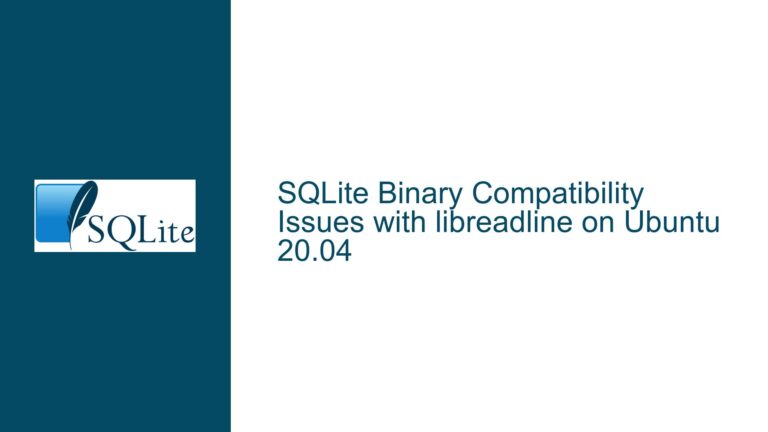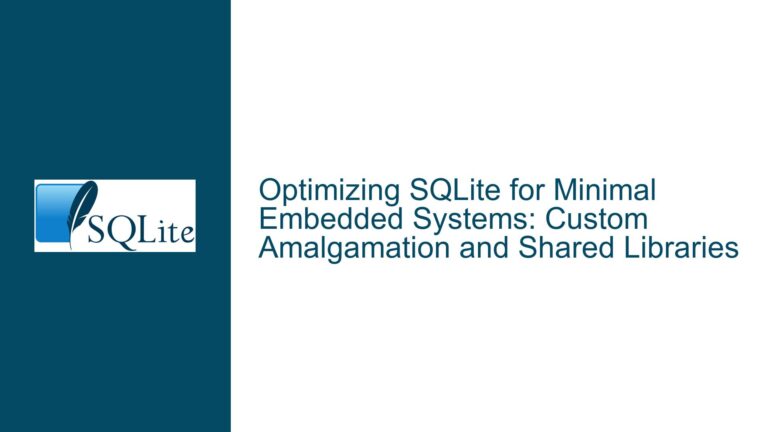Missing uMask Parameter in System.Data.SQLite Trace Event Due to Deprecated sqlite3_trace API
Understanding the Trace Event Limitation in System.Data.SQLite and SQLite Core Version Mismatch
The absence of the unsigned uMask parameter in the Trace event handler of the System.Data.SQLite library stems from its reliance on the deprecated sqlite3_trace API instead of the modern sqlite3_trace_v2 interface. This limitation prevents developers from filtering trace events by type (e.g., statements, profiles, or row operations) using a bitmask. Additionally, the underlying SQLite core library version bundled with System.Data.SQLITE may lag behind the latest upstream release (e.g., 3.40.1), creating inconsistencies in feature availability and security across environments. These issues are interconnected: modern SQLite versions include critical fixes and enhancements that align with the capabilities of sqlite3_trace_v2, but System.Data.SQLite’s dependency chain must first adopt these updates to expose the full functionality.
The sqlite3_trace API, while functional for basic logging, lacks granular control over event types. In contrast, sqlite3_trace_v2 accepts a uMask parameter that allows developers to subscribe to specific event categories, reducing overhead and improving debugging efficiency. The absence of this parameter in System.Data.SQLite forces developers to process all trace events indiscriminately, which can degrade performance in high-throughput scenarios. Furthermore, outdated SQLite core libraries compound this problem by missing optimizations, security patches, and compatibility improvements present in newer releases. This creates a dual challenge: developers cannot leverage modern tracing capabilities and risk inconsistencies when interoperating with systems using up-to-date SQLite versions.
Root Causes: Deprecated Tracing API and Delayed SQLite Core Updates
The primary cause of the missing uMask parameter is System.Data.SQLite’s continued use of the legacy sqlite3_trace function. This API binds tracing to a single callback without event-type filtering, whereas sqlite3_trace_v2 supports multiple callbacks and event masking. The transition to sqlite3_trace_v2 requires modifications to the System.Data.SQLite codebase to map the .NET event model to the updated C API, including marshaling the uMask parameter and handling event registration. Until this transition is complete, developers cannot access the advanced tracing features of modern SQLite.
A secondary cause is the version gap between the SQLite core library embedded in System.Data.SQLite and the latest upstream SQLite release. System.Data.SQLite historically bundles a specific SQLite version, which may not match the version used by other components in a project. For example, if an application uses System.Data.SQLite with SQLite 3.39.4 while another component relies on SQLite 3.40.1, subtle differences in behavior or performance may arise. This version mismatch is particularly problematic when newer SQLite features (like sqlite3_trace_v2) are required but unavailable in the bundled library. The delay in updating the core library stems from the need for rigorous compatibility testing, especially given System.Data.SQLite’s support for multiple platforms (x86/x64, Windows/Linux).
Resolution: Upgrading to Trunk Builds, Rebuilding Binaries, and Aligning SQLite Versions
To resolve the missing uMask parameter, developers must use a version of System.Data.SQLite that integrates sqlite3_trace_v2. As confirmed in the discussion, this functionality is available in the trunk branch of the System.Data.SQLite Fossil repository. Follow these steps to implement a fix:
Access the Trunk Code: Clone the Fossil repository using the command
fossil clone https://system.data.sqlite.org/ sds.fossil, then open the repository withfossil open sds.fossil. Navigate to the trunk branch to access the latest code. Ensure build tools (e.g., Visual Studio 2022, .NET SDK) are installed.Rebuild System.Data.SQLite: Open the solution file for your target platform (e.g.,
SQLite.NET.slnfor .NET 6). Set the build configuration to Release and target x86 or x64. Resolve dependencies such as the SQLite amalgamation source (sqlite3.candsqlite3.h), which may require downloading the latest SQLite core version (e.g., 3.40.1) and replacing the bundled files. Compile the project to generate updatedSystem.Data.SQLite.dlland native interop binaries.Validate the Trace_v2 Integration: After rebuilding, reference the new binaries in your project. Verify that the
Traceevent now includes parameters foruMaskor that a new event (e.g.,TraceV2) is exposed. Test by subscribing to trace events with different masks (e.g.,SQLITE_TRACE_STMT,SQLITE_TRACE_PROFILE) and confirming only the requested events fire.Align SQLite Core Versions: Ensure the rebuilt System.Data.SQLite uses the same SQLite core version as other components in your ecosystem. Replace the default amalgamation code in the System.Data.SQLite source tree with the desired SQLite version’s source files. Rebuild and distribute the updated binaries to all clients to eliminate version discrepancies.
If building from source is impractical, monitor the System.Data.SQLite release page for the next stable version, which will include sqlite3_trace_v2 and an updated SQLite core. Until then, consider these workarounds:
- Manual Event Filtering: Use the existing
Traceevent but discard unneeded events in your handler. - Interop Shim: Write a native wrapper DLL that calls
sqlite3_trace_v2directly and invoke it via P/Invoke.
By adopting the trunk build and aligning SQLite core versions, developers gain access to modern tracing capabilities while ensuring cross-component consistency.
